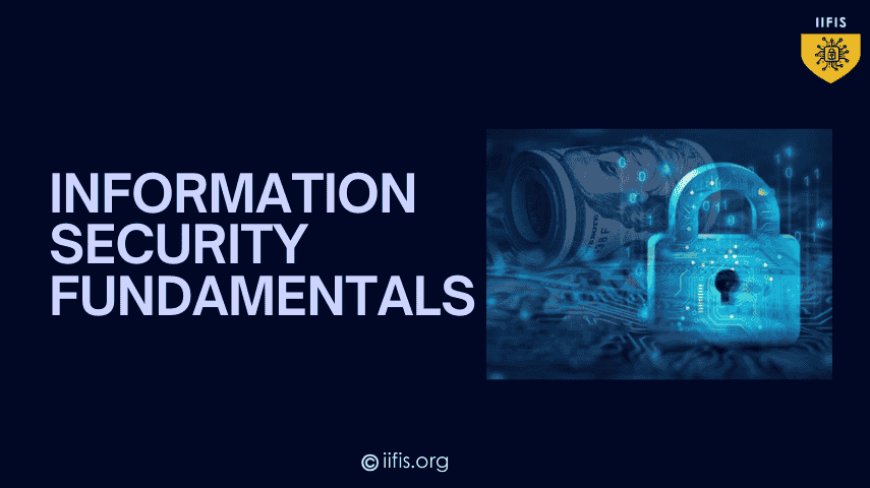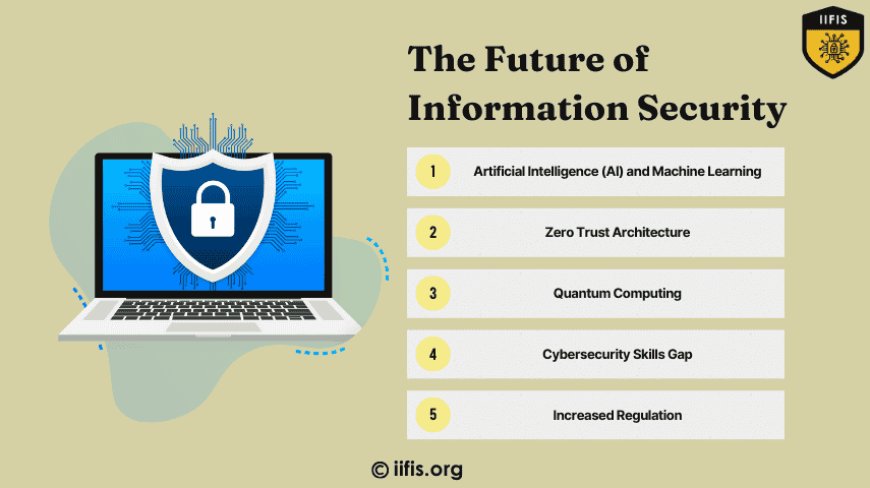Information Security Fundamentals: What You Need to Know
Learn the basics of information security, its importance, common threats, and tips to protect data for individuals and businesses in a digital world

We are constantly sharing personal and sensitive information online, from banking details to private work documents. With this sharing comes the risk of cyberattacks and data breaches, making information security fundamentals more important than ever. Protecting this data is crucial for both individuals and businesses to prevent theft, alteration, or loss. Imagine the damage if your personal information or a company's confidential data fell into the wrong hands. Information security fundamentals help build trust by ensuring that the data we share remains safe, and as cyber threats continue to evolve, understanding and implementing strong security practices has become essential for everyone.
What is information security?
Information security refers to the practices, policies, and tools used to protect data from unauthorized access, disclosure, alteration, or destruction. It aims to ensure that information remains secure in terms of confidentiality, integrity, and availability—often referred to as the CIA Triad:
-
Confidentiality: protecting sensitive information from unauthorized access.
-
Integrity: ensuring the accuracy and reliability of information.
-
Availability: making sure information is accessible when needed.
Simply put, information security ensures that only authorized individuals or systems can access or alter sensitive data, preventing misuse or loss.
Why is information security important?
The importance of information security cannot be overstated. With the rise of cyber threats, such as hacking, ransomware, and data breaches, protecting sensitive data has become a necessity.key reasons why information security is critical:
-
Preventing Data Breaches: A data breach can lead to financial losses, reputational damage, and legal consequences. Secure systems help prevent unauthorized access to confidential information.
-
Maintaining Privacy: With the vast amount of personal data being stored online (e.g., medical records, financial information), information security ensures that personal privacy is protected.
-
Business continuity: information security helps ensure the availability of critical data and systems, allowing businesses to operate smoothly without disruption from cyberattacks or technical failures.
-
Compliance: Many industries, like healthcare and finance, are subject to regulations that require organizations to implement strong security measures. Non-compliance can lead to penalties.
Who Benefits from Information Security?
Everyone, from individuals to large corporations, benefits from effective information security measures.
-
Individuals: People who value their privacy benefit from security practices that keep their personal information safe from hackers and identity thieves. Strong password management, encryption, and secure internet usage all play a role in protecting users.
-
Organizations: Businesses of all sizes depend on information security fundamentals to protect intellectual property, customer data, and financial records. Effective security prevents cyberattacks, minimizes downtime, and ensures smooth operations.
-
Government and Critical Infrastructure: Governments and sectors like healthcare, finance, and utilities rely on information security to maintain national security, protect citizens' data, and avoid disruptions to essential services.
-
Cybersecurity Professionals: The growing demand for skilled professionals in information security has created many career opportunities in the field, offering roles like security analysts, ethical hackers, and security engineers.
Who Should Consider Information Security?
Information security is relevant to a wide range of professionals, especially those working in industries that handle sensitive or personal data. Here’s who should consider pursuing information security knowledge:
-
IT Professionals: System administrators, network engineers, and software developers should understand information security to build secure systems and prevent vulnerabilities.
-
Business Owners and Managers: Anyone responsible for managing or securing company data needs to be familiar with the basics of information security to mitigate risks.
-
Students and Job Seekers: Individuals looking to enter the growing field of cybersecurity will benefit from gaining a solid understanding of security principles and practices.
-
Healthcare and financial : Those working in highly regulated industries must be well-versed in information security to comply with privacy laws and regulations.
-
General Users: Everyone, regardless of profession, can benefit from understanding personal cybersecurity practices, such as how to recognize phishing scams or use strong passwords.
Certifications in Information Security
Certifications can greatly enhance your career in information security, demonstrating expertise and commitment to the field. Some of the most recognized certifications include:
-
Certified Information Systems Security Professional (CISSP): A globally recognized certification for experienced professionals in the field of information security.
-
Certified Ethical Hacker (CEH): A certification for those interested in learning how to identify and address vulnerabilities in systems by thinking like a hacker.
-
Certified Information Security Manager (CISM): Focuses on managing and governing an enterprise’s information security program.
-
CompTIA Security+: A foundational certification for those new to information security, covering key security concepts and practices.
-
Certified Cloud Security Expert (CCSE): A certification for those interested in securing cloud environments, a growing area in the IT industry.
These certifications not only validate skills but also help professionals stay updated with the latest industry practices and standards.
The Future of Information Security
The future of information security is promising yet challenging. As technology evolves, so do the threats, leading to increased demand for cybersecurity professionals. Here are some trends and developments shaping the future of information security:
-
Artificial Intelligence (AI) and Machine Learning: AI will play a key role in identifying threats and anomalies faster than traditional methods. These technologies can help predict and prevent attacks before they happen.
-
Zero Trust Architecture: More organizations are adopting a "never trust, always verify" approach, where every user and device is continuously authenticated before accessing resources, reducing the risk of insider threats.
-
Quantum Computing: While still in its early stages, quantum computing has the potential to revolutionize encryption and data security. It could also pose new challenges by rendering current encryption methods obsolete, which is why the industry is already looking into quantum-resistant encryption.
-
Increased Regulation: Governments and industries are expected to implement stricter regulations for data protection, driving organizations to adopt better security practices and frameworks.
-
Cybersecurity Skills Gap: With the increasing number of cyberattacks, the demand for qualified cybersecurity professionals will continue to rise, making the field a highly rewarding career choice.

Real-Life Examples of Security
Data Breaches: One of the most well-known data breaches was the Equifax hack in 2017, where hackers accessed the personal information of 147 million people, including names, Social Security numbers, and birthdates. Another example is the Target breach in 2013, where hackers stole credit and debit card details from over 40 million customers. These incidents show how easily sensitive data can be stolen when security isn’t strong enough.
Lessons Learned: After these breaches, both Equifax and Target took steps to improve their security. Equifax, for example, invested heavily in better encryption and monitoring systems to protect sensitive data. Target improved its point-of-sale systems to prevent future credit card thefts and ensured its systems were more secure. These companies learned the hard way that security is not something you can overlook, and they’ve worked hard to make sure similar attacks don’t happen again.
As more devices become connected through the Internet of Things (IoT) and as businesses adopt cloud computing, information security will continue to evolve to address new challenges. Staying informed and adaptable will be crucial for both organizations and individuals.
Information security is essential for protecting data in our increasingly digital world. By understanding the fundamentals, including what it is, why it matters, who benefits, and how you can pursue certifications, you can begin to appreciate the growing importance of securing information. Whether you are looking to enhance your career or simply protect your personal data, understanding the core principles of information security is the first step in ensuring a safer digital future.
























